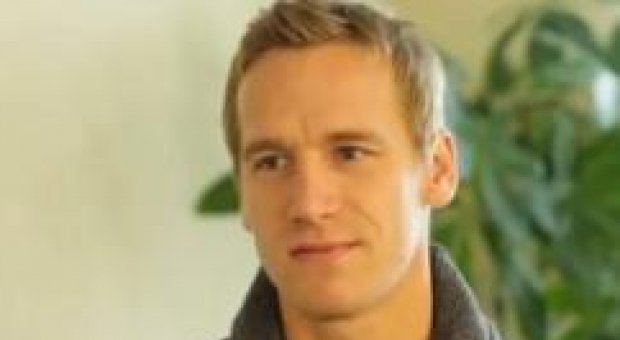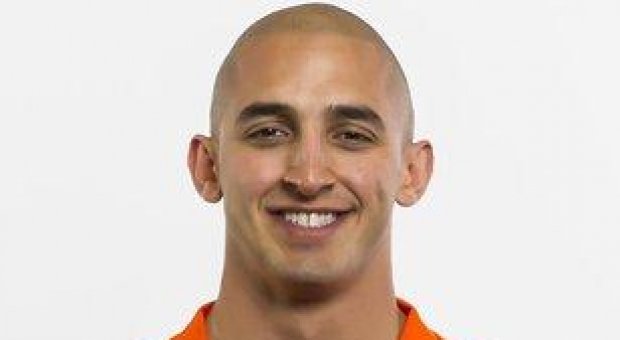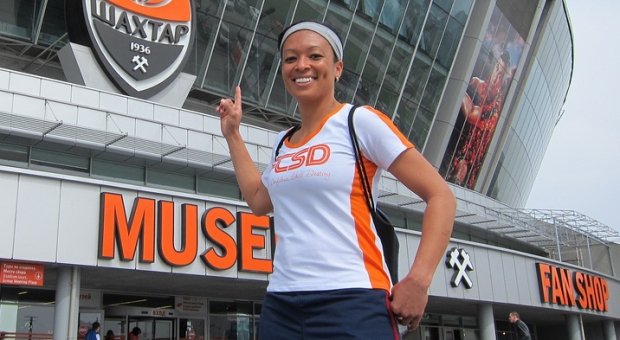
Former Montreal Impact soccer player David Testo. Credit: Xtra file photo

University of Ottawa student Scott Heggart. Credit: YouCanPlay.org

BC Lions' wide receiver Marco Iannuzzi will moderate the forum. Credit: bclions.com
Gay athletes and their allies will talk about homophobia in sport as part of a public forum to be held at Michael J Fox Theatre March 28.
BC Lions’ wide receiver Marco Iannuzzi will moderate the forum, which will feature Olympic gold medallist and former US women’s national soccer team player Angela Hucles, former Montreal Impact soccer player David Testo, and hockey player Scott Heggart, a University of Ottawa student.
The event is a joint initiative of the Burnaby Teachers’ Association (BTA), the Burnaby Board of Education and the You Can Play campaign, which challenges professional sports organizations to support and welcome gay athletes.
The BTA’s Frank Bonvino says the participation of Vancouver Canucks player Manny Malhotra in last year’s Vancouver Pride parade was the inspiration for the forum.
“He was there on behalf of You Can Play. If you get a pro athlete to become involved with something like this, it really brings it to the forefront, because unfortunately in the athletic world, there’s been little to no progress with homophobia.”
Bonvino says he contacted You Can Play to discuss ways in which the campaign could help make the district’s anti-homophobia policy become a living document.
Burnaby trustees approved Policy 5.45 in June 2011 after hundreds of parents staged a number of rallies in protest against its content.
“Like any other policy, if it’s something that sits at the back of a filing cabinet and gathers dust, then it’s not really worth the paper it’s printed on,” Bonvino says. “We want to take this anti-homophobia and gender-identity policy and bring it to life.”
You Can Play co-founder Glenn Witman says the campaign receives emails on a regular basis from athletic directors and various universities, requesting its participation in similar forums.
“One of the hardest things to deal with on a sports team is what’s being said in the locker room and in the stands,” says Witman, 43, who grew up playing sports.
“I think it’s always going to be like that, but it is starting to change. Guys are messing around, and now they’re starting to learn that their words are hurting their friends. With players speaking up about it that are professionals, more and more awareness is going to happen.”
Fresh off the Baltimore Ravens’ Super Bowl victory over the San Francisco 49ers, linebacker Brendon Ayanbadejo made good on his wish to use the media spotlight on the event to speak out in support of what he calls “just rights.”
Ayanbadejo was a spokesperson for Marylanders for Marriage Equality in the leadup to last fall’s American elections, in which a majority of Maryland, Maine and Washington State voters supported same-sex marriage at the ballot box.
The linebacker, along with outspoken Minnesota Vikings punter Chris Kluwe and other National Football League players, is part of Athlete Ally, a non-profit sports group that also challenges those involved in sport to respect people, regardless of perceived or actual sexual orientation, gender identity or gender expression.
In an interview with CNN, Ayanbadejo said that he wasn’t aware of any current gay NFL players but that it’s important to lay the groundwork for the time when gay players decide to come out.
“When our Jackie Robinson comes out, he’s going to have a supporting cast around him, and we’re going to support him and we’re going to treat him just like we treat everybody else . . . with love and fairness and kindness and compassion, because we know it’s really gonna be a tough burden on that person.”
More recently, Kenneth Faried, of the Denver Nuggets basketball team, became the first NBA player to join Athlete Ally, while Kobe Bryant, of the Los Angeles Lakers basketball team, who was fined $10,000 for using an anti-gay slur during a game last April, took a fan to task for using a homophobic slur.
Still, Witman says, it’s hard to say if the sporting world has reached a tipping point.
“You have so many young people just using the word fag and gay so easily, they don’t think they’re actually hurting someone, but they really are, so maybe it’s going to take a gay Jackie Robinson to come out to wake them up.”
Witman says school leadership — team captains and coaches speaking up at a “grassroots level” — is critical in the bid to change attitudes.
Outreach to fans is also key, he adds. “It’s not just in the locker rooms, but in the stands. That’s one of our objectives, is to change that language.”
He says people use gay and fag “like it’s going out of style.”
“It’s not just yelling at the player on the field, but the young kids that are in the stands right next to them hearing these words.”
Witman says homophobia and sexual orientation are tough topics, but once players find out that one of their teammates might be gay, people listen “real fast.”
He points to the experience of You Can Play co-founder Patrick Burke, who spoke to the University of Denver more than two years ago.
Witman says the university’s hockey team now has a locker-room talk for rookies about homophobia.
“When you have a Division 1 hockey team and they’re taking notice of this and making changes, things are working.”
For more on Xtra‘s coverage of You Can Play, click on the links below:
Will the Burkes’ You Can Play campaign change hockey culture?
Toronto Maple Leafs stars support gay players
Canucks stars have a message for gay athletes: You can play
Marlies sign ‘groundbreaking’ pledge to support gay teammates


 Why you can trust Xtra
Why you can trust Xtra


